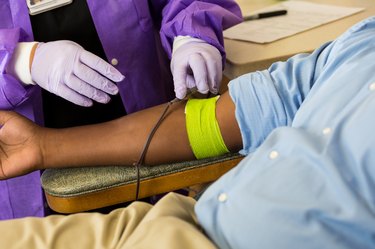
Giving blood is a great way for healthy, physically active people to give back. But if you're following a training plan or in a good groove with your fitness habits, you might want to know how donating blood affects your workouts.
In short, experts say there's no reason not to give blood if you're generally healthy. You just need to think through the best timing in relation to your workouts.
Video of the Day
Video of the Day
In light of the coronavirus pandemic, LIVESTRONG.com is raising awareness about the urgent need for people to donate blood with our Give Blood, Give Back series.
How Donating Blood Affects Athletic Performance
Donating one pint of blood (the typical amount drawn during a whole blood donation) reduces blood volume by about one tenth, according to the American Red Cross. Because oxygen travels throughout your body via the bloodstream, having less blood on board can affect how you perform during your workouts.
A little biology to understand why: After you donate, it takes about a day for your body to replace the fluid portion of your blood, called plasma, according to the Red Cross. It can take four to six weeks for red blood cells to reach their pre-donation levels.
That lag time can temporarily impair endurance athletes' performance, according to the National Academy of Sports Medicine (NASM). Several studies of active young adults show there's a 24- to 48-hour dip in exercise performance after blood donation.
"If you are a truly Olympic-class competitive athlete, donating blood is probably not something you want to do in the three to four weeks before the competition."
While there's some research out there on the exercise effects of blood donation, more is needed, according to an April 2019 review in PLOS One. It found that, after donation, there's a short-term dip in maximal oxygen update (how much oxygen people can inhale and use), but it seems to return to normal within a day or two.
Earlier research linked blood donation with "small but potentially physiologically important reductions" in maximal oxygen uptake, exercise capacity and concentrations of hemoglobin, the protein that carries oxygen in the blood, according to a February 2017 review in Transfusion. (And even then, the researchers said the only studies available for review were of "low quality.")
But let's take a look at that maximal oxygen uptake issue: When you test elite athletes, their uptake, measured by what's called VO2 max, might be down 3, 5 or even 8 percent compared with pre-donation levels, says Jed Gorlin, MD, vice president and medical director at Innovative Blood Resources in St. Paul, Minnesota.
For a competitive runner where seconds count, it might mean the difference between a 4:10 mile and a 4-minute mile, he says. "If you are a truly Olympic-class competitive athlete, donating blood is probably not something you want to do in the three to four weeks before the competition."
That said, most everyday athletes and fitness fans won't notice any significant lingering effects after giving blood. "In truth, for most of us it's not something you or I could sense after a couple of days," Dr. Gorlin says.
Can You Work Out Before Donating Blood?
It's best to avoid doing any intense exercise or heavy lifting before giving blood, according to the National Health Service. This is because it's important to keep your body in a "rested state" in order to be able to replenish the fluids lost during blood donation. Otherwise, you run the risk of becoming lightheaded or dizzy.
Light exercise, like walking, is OK to do before donating blood. Just make sure you give yourself enough time between the two activities to be able to hydrate and recover.
Take It Easy After Donating Blood
The advice for most of us: Get plenty of fluids and avoid hard physical exertion, including heavy lifting or high-intensity interval training for the rest of the day, according to the Red Cross. For 24 hours, avoid any activities during which if you passed out you may injure yourself.
"Maybe a light walk is fine, but you definitely don't want to go run many miles or do something intense," says registered dietitian and certified personal trainer Maxine C. Yeung, RD, CPT. "Wait a day."
And no matter what exercise you do or don't do after donating blood, always listen to your body. If you notice any dizziness or lightheadedness, end your workout right there. Sit or lie down, wait for it to pass and then gradually get back up and get some fluids and food in you.
Related Reading
- American Red Cross "50 Quick Facts"
- American Red Cross: "Frequently Asked Questions"
- National Academy of Sports Medicine: "Donating Blood and Exercise: What Athletes Should Know"
- PLOS One: "The Acute Effects of Whole Blood Donation on Cardiorespiratory and Haematological Factors in Exercise: A Systematic Review"
- Transfusion: "The Effect of a Standard Whole Blood Donation on Oxygen Uptake and Exercise Capacity: A Systematic Review and Meta-Analysis"
- American Red Cross: "What to Do Before, During and After Your Donation"
- National Health Service: "Preparing to Give Blood"